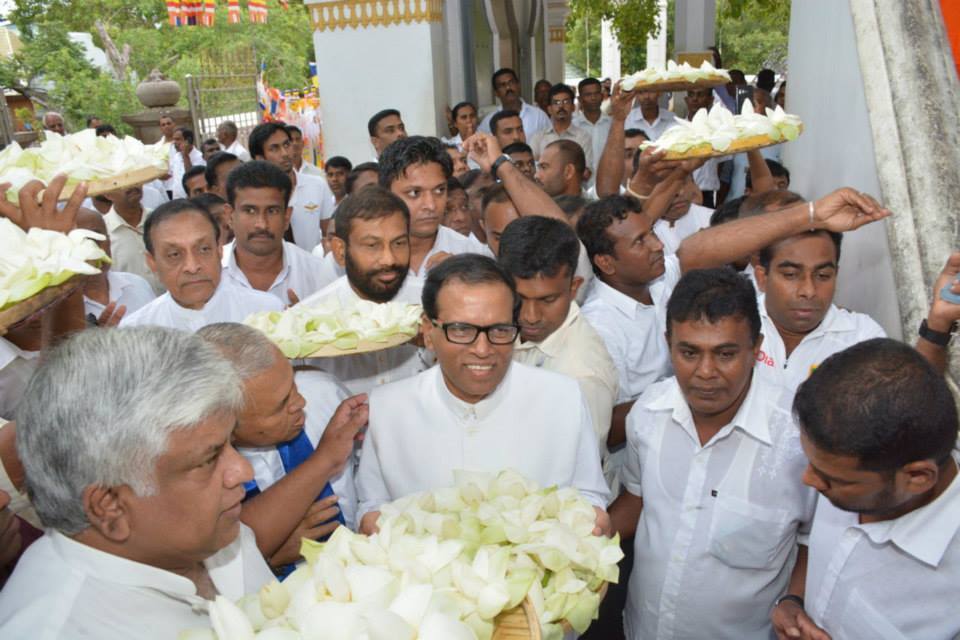My New Year’s Wish – A Change Of Status Quo

By Chrishmal Warnasuriya -January 1, 2015
Why I wish for a “change of guard”

Frankly (and in a few words), I am utterly disgusted with what I see! From such a promising future that was so easily within our grasp with the defeat of terror in 2009, we have done everything but capitalize on it; and even at the risk of being tagged a non-patriot, I am not willing to allow a regime to remain simply out of “gratitude”! We will be eternally indebted to H.E. President Rajapaksa (MR) for leading us with unparalleled political defiance during that period, thus paving the way for the ensuing military victory by our valiant forces; unfortunately though, the administration has failed miserably thereafter to manage the country according to democratic norms and standards accepted universally, such as good governance, the rule of law, equal and equitable distribution of economic benefits and this cannot be tolerated any longer by any right-minded citizen.

Frankly (and in a few words), I am utterly disgusted with what I see! From such a promising future that was so easily within our grasp with the defeat of terror in 2009, we have done everything but capitalize on it; and even at the risk of being tagged a non-patriot, I am not willing to allow a regime to remain simply out of “gratitude”! We will be eternally indebted to H.E. President Rajapaksa (MR) for leading us with unparalleled political defiance during that period, thus paving the way for the ensuing military victory by our valiant forces; unfortunately though, the administration has failed miserably thereafter to manage the country according to democratic norms and standards accepted universally, such as good governance, the rule of law, equal and equitable distribution of economic benefits and this cannot be tolerated any longer by any right-minded citizen.
Denial of our sovereign power to govern ourselves
Although Article 3 of the Constitution proudly proclaims that Sovereignty of this Republic lies in us its PEOPLE and is inalienable, this regime has, by carefully calculated moves shrouded in meticulously stage-managed PR and media exercises, surreptitiously alienated those rights from us, which in my humble opinion, denies them the mandate to administer us any further. I am reminded of the authoritative wording used by the framers of the US Declaration of Independence – (quoting excerpts only) Read More
Displacement And Deception: The History Of Lanka

By Sajeeva Samaranayake – January 1, 2015
Stability and drift: our history up to 1505
Senaka Bandaranayake identifies the period between 1000 – 500 BC as the time when the islanders moved ‘from stone age food gathering to the making of pottery, sedentary farming, irrigation, wet rice cultivation and iron technology.’ From 500 BC up to the beginning of the Common Era there is a period of remarkable growth in which there is ‘complex social and political systems, adoption of a higher religion, the formation of a (relatively) centralised state and an advanced literate civilization – the latter, centuries earlier than similar developments in mainland or insular Southeast Asia or Japan.[1]
This growth phase coincided with several waves of migration from North Eastern India – also referred to as the Aryan migrations. The majority Sinhala population derive their identity from these migrations while the Tamils trace their ancestry to the Dravidians of South India. The North Indian migrants evolved a distinct agrarian culture and way of life centred around Buddhist values. According to Rambukwelle this ancient state consolidated a balance of power between the king, the Buddhist monastic order or Sangha and the self – sufficient village which was the key economic unit of production. Up to the final demise of Sinhalese monarchy in 1815 the village also provided men and materials for the defence of the country in times of war and the state was not unduly militarized.[2]
This ancient state was blessed with continuity for a period of approximately 1500 years. The kingdoms of Anuradhapura (1300 years) and Polonnaruva (200 years) in the North Central plains maintained a robust spirit of self reliance, internal cohesion and economic sovereignty during this period notwithstanding a number of South Indian invasions – all of which were effectively repulsed or driven out after relatively short periods of foreign rule.


